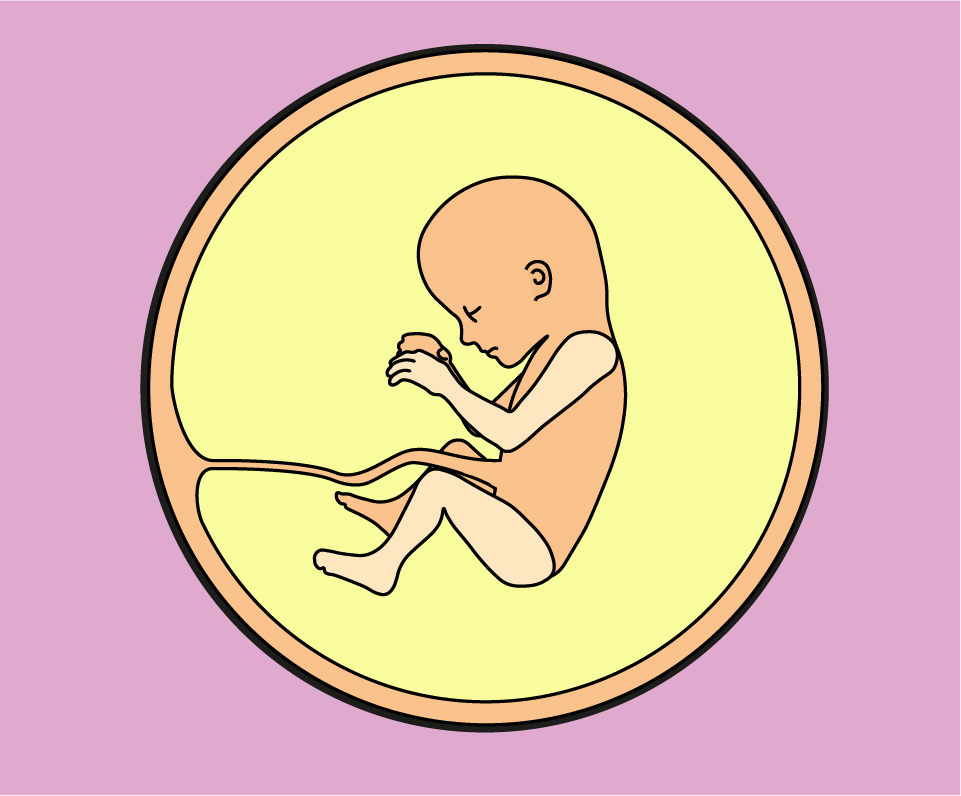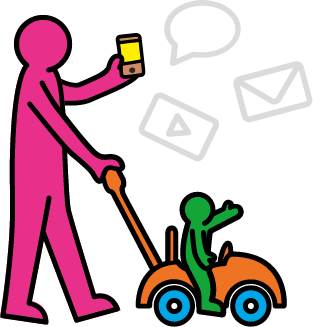Week-by-week guide to pregnancy
2nd trimester
Our week-by-week pregnancy guide is full of essential information. From staying fit in pregnancy to advice on your maternity rights, you'll find it all here.
Week 18 – your 2nd trimester
You may feel your baby move for the first time around now. If you are feeling something now, it may feel like a gentle fluttering sensation.
What's happening in my body?
You might be starting to feel a bit clumsier as your belly gets bigger. Your breasts may have gone up a size, too, particularly if it's your first pregnancy. Your blood pressure is probably a bit lower than it was, so do not leap up from the sofa, or it could make you feel dizzy.
Your baby has been moving around for the past couple of months, but you might not have noticed. You may start feeling some movement now though – it feels like a bubbling or fluttering inside your belly.
You may also notice a line down your stomach, called the “linea nigra” (Latin for "black line"). This is normal skin pigmentation and nothing to worry about. It will probably vanish a few months after the birth.
Your anomaly scan
You'll be offered an anomaly scan at around 18 to 20 weeks. This is a scan that looks at your baby in detail to see if there is anything unusual about their development and appearance. It can pick up a range of conditions, but not all of them.
The scan will not hurt you or your baby, but it may feel a bit uncomfortable as the sonographer may have to apply a bit of pressure on your stomach to get the best possible view.
Read more about why scans are offered and what they involve on the NCT website.
Is it a boy or a girl?
The sonographer may be able to tell you at this scan, but not everyone wants to know, and it's not always the hospital policy to reveal the sex of the baby. If you do not want to know, tell them before you start of your scan appointment.
Free prescriptions and dental care
Did you know that prescriptions are free during pregnancy? NHS dental treatment is also free. You just need a Maternity Exemption Certificate or card (MatEx).
Ask your midwife, GP or health visitor for the application form FW8. Your certificate will be valid for up to a year after your baby's due date or date of birth.
2nd trimester pregnancy symptoms (at 18 weeks)
Hopefully you are feeling more energetic and able to manage your pregnancy symptoms now. If you are struggling with day-to-day life, talk to your midwife or doctor, they are there to support you.
Your signs of pregnancy could include:
- stretch marks (read about stretch marks on week 17's page)
- tiredness and sleeping problems (week 19 has information about feeling tired)
- swollen and bleeding gums (week 13 has information about gum health during pregnancy)
- pains on the side of your belly, caused by your expanding womb (known as "round ligament pains")
- headaches
- nosebleeds
- bloating and constipation (read about bloating on week 16's page)
- indigestion and heartburn (week 25 talks about digestive problems)
- sore breasts
- leg cramps
- feeling hot
- dizziness
- swollen hands and feet
- urine infections
- vaginal infections (see week 15 for vaginal health)
- darkened skin on your face or brown patches – this is known as chloasma or the "mask of pregnancy"
- greasier, spotty skin
- thicker and shinier hair
You may also experience symptoms from earlier weeks, such as:
- morning sickness (read about dealing with morning sickness on week 6's page)
- weird pregnancy cravings (read about pregnancy cravings on week 5's page)
- a heightened sense of smell
- mood swings (week 8's page has information on mood swings)
- a white milky pregnancy discharge from your vagina and light spotting (seek medical advice for any bleeding)
Read Tommy's guide to common pregnancy symptoms.
What does my baby look like?
Your baby, or foetus, is around 14.2cm long from head to bottom, and weighs around 190g. That's approximately the size and weight of a sweet red pepper.
Your baby's hearing, feeling, swallowing and sucking reflexes are developing this week. They will also be doing a lot of wriggling around and moving their arms and legs.

Action stations
Many women will tell their employer after they've had their first pregnancy scan at around 12 weeks. Once you tell your employer, you have maternity rights and can attend antenatal appointments during paid work time. You can also ask for a risk assessment of your workplace to ensure that you're working in a safe environment.
It's a good time to tone up your pelvic floor muscles. Gentle exercises can help to prevent leakage when you laugh, sneeze or cough. Get the muscles going by pretending that you're having a wee and then stopping midflow. Visit Tommy's for more ideas about pelvic floor exercises.
Ask your midwife or doctor about online antenatal classes – they may be able to recommend one. The charity Tommy's has lots of useful information on antenatal classes and preparing you for birth.
Even if you've had children before, they're still worth going to as you can meet other parents-to-be. The NCT offers online antenatal classes with small groups of people that live locally to you.
Do your best to stop smoking, give up alcohol and go easy on the tea, coffee and anything else with caffeine. Ask your midwife or GP for support if you need it.
To keep bones and muscles healthy, we need vitamin D. From late March/early April to the end of September, most people make enough vitamin D from sunlight on their skin. However, between October and early March, you should consider taking a daily vitamin D supplement because we cannot make enough from sunlight.
Some people should take a vitamin D supplement all year round, find out if this applies to you on the NHS website. You just need 10 micrograms (it's the same for grown-ups and kids). Check if you're entitled to free vitamins.
It's recommended that you do 150 minutes of exercise a week while pregnant. You could start off with just 10 minutes of daily exercise - perhaps take a brisk walk outside. Check out Sport England's #StayInWorkOut online exercises (scroll to the pregnancy section). Listen to your body and do what feels right for you.
There's no need to eat for 2. You don't need any extra calories until the third trimester, which starts in week 28. Try to eat healthily, with plenty of fresh fruit and veg, and avoid processed, fatty and salty foods. You may be able to get free milk, fruit and veg through the Healthy Start scheme.
You and your family should follow the government and NHS guidance on coronavirus (COVID-19):
To find out about about COVID-19 and pregnancy, childbirth and breastfeeding, have a look at advice on the:

Sign up now for our pregnancy, baby and toddler guide
Get personalised emails for trusted NHS advice, videos and tips on your pregnancy week by week, birth and parenthood.